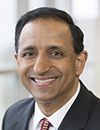Plenary Speakers

The Forever Exponential? Moore's Law: Past, Present and Future
Kaizad Mistry
Intel Corporation
Abstract: Moore's Law has governed the semiconductor industry for over five decades and the resulting technologies have fundamentally changed the world. How has Moore's law evolved historically and what is its future? Gordon Moore himself said that "No exponential is forever," but innovation has kept it going far longer than many had prognosticated. While the number of components on a chip has increased steadily over this time horizon, the way in which this has been achieved has evolved many times. Bipolar transistors gave way to MOS transistors, planar transistors to FinFETs, aluminum wires to copper wires. What does the future of Moore's Law hold? What innovations will power it over the next decade and beyond? Topics to be discussed include transistor scaling, interconnect scaling and heterogeneous integration.
Biography: Kaizad Mistry is corporate Vice President and co-director of the Logic Technology Development organization at Intel Corporation. He managed the development of Intel's 22nm process technology, the world's first to feature 3-D Tri-Gate transistors. Previously, he managed the development of Intel's 45nm logic technology, the world's first to feature high-k plus metal gate transistors. He played a key role in the development of Intel's 90nm logic technology, the world's first implementation of strained silicon transistors. Prior to joining Intel in 1998, he spent 12 years at Digital Equipment Corp. where he worked on the development of successive process technology generations from 1.5um CMOS through 0.25um CMOS.
He is an IEEE Fellow and has authored or co-authored more than 70 journal and conference papers and holds over 20 patents. In 2006, he was general chair of the IEEE International Electron Devices Meeting, the industry's flagship conference on semiconductor devices. In 2019, he was the recipient of the Distinguished Alumnus Award from the Indian Institute of Technology, Bombay. He holds a bachelor's degree in electrical engineering from the Indian Institute of Technology, Bombay and a master's degree in electrical engineering from the University of Southern California.